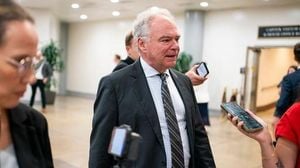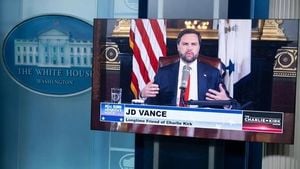President Claudia Sheinbaum’s Thursday morning press conference on September 11, 2025, provided a sweeping look at the most urgent issues facing Mexico, from the aftermath of a deadly explosion in Mexico City to sweeping economic and health reforms. Her remarks, delivered with characteristic candor, offered both solace and clarity in a week marked by tragedy, political violence, and ambitious policy announcements.
The day’s somber tone was set by the aftermath of a catastrophic gas tanker explosion in Iztapalapa, a populous borough of Mexico City. According to Heraldo USA, the incident left four dead and ninety injured, with the Mexican Social Security Institute (IMSS) treating 26 patients, ISSSTE caring for 32, and IMSS Bienestar activating an emergency command for 27 more. President Sheinbaum, expressing deep concern, said her administration was working closely with Mexico City Mayor Clara Brugada. “We are providing all the support that is needed. Our solidarity to all those families who have lost someone. Whatever is needed, we will be very attentive,” she stated, as reported by Mexico News Daily. She reiterated that public hospital care would be free and that the company responsible for the explosion would cover the costs of damages.
The tragedy prompted calls for stricter tracking measures in fuel transportation, a move intended to prevent similar disasters in the future. The president’s focus on coordinated medical care and immediate government response was widely recognized as a testament to the administration’s commitment to public safety and health.
But the week’s violence was not limited to Mexico. President Sheinbaum also condemned the assassination of Charlie Kirk, a prominent conservative U.S. political activist and Donald Trump ally, who was shot while speaking at Utah Valley University on September 10. “We’re completely against any violence and particularly political violence,” she said. “Therefore, our condemnation … of acts of this kind,” Sheinbaum stressed, highlighting that Mexico itself is no stranger to political violence. The 2024 electoral season was the most violent in modern Mexican history, with more than 30 candidates and political aspirants murdered, a grim reminder of the country’s ongoing struggle with security and stability.
Turning to economic matters, Sheinbaum addressed the government’s proposal to impose new tariffs on imports from countries without free trade agreements with Mexico, including China, South Korea, India, and Thailand. On September 9, the president sent a bill to Congress seeking approval for tariffs ranging from 10% to 50% on a wide array of imports. This move, she explained, is part of Plan México, an ambitious industrial policy aimed at strengthening the national economy. “We don’t want any conflict with any country,” Sheinbaum told reporters, noting that she had recently received a letter of credence from China’s ambassador and was engaged in diplomatic talks with representatives from all affected nations. “What we want is to speak, without the need to cause any conflict,” she emphasized, according to Mexico News Daily.
The South China Morning Post reported that China condemned Mexico’s plan, calling the tariffs discriminatory and the result of outside pressure. Sheinbaum, however, was adamant that the tariffs were not intended to improve Mexico’s negotiating position in the upcoming 2026 United States-Mexico-Canada Agreement (USMCA) review. “The plan to impose new tariffs is part of a ‘national project’ and not related to the negotiations with the United States,” she asserted. She highlighted that discussions about Plan México, import substitution, and industrial strengthening predated the 2024 U.S. presidential election.
Support for the tariff plan has come from various productive sectors, business associations, and workers, with Sheinbaum insisting that the policy is a domestic effort to fortify the economy, not a maneuver in international trade negotiations. The president’s balancing act—asserting Mexico’s economic sovereignty while maintaining diplomatic dialogue—was on full display.
On the health front, Sheinbaum’s administration rolled out a comprehensive new national health strategy, as detailed by Heraldo USA. Minister of Health David Kershenobich Stalnikowitz outlined four main pillars: prevention and promotion, modern primary care, innovative treatments, and specialized high-level care. The goal is to reduce chronic disease incidence, guarantee access to advanced therapies, and bolster the healthcare system’s capacity to save lives and improve quality of life.
One of the most significant reforms is the increase in the special excise tax (IEPS) on soft drinks, set to rise from 1.65 to 3.1 pesos per liter in 2026. Deputy Minister of Health Eduardo Clark explained that this measure is expected to generate 41 billion pesos (approximately US$2.21 billion) for healthcare funding. With Mexico leading the world in per capita soft drink consumption—166 liters per person per year—the tax aims to reduce consumption by an additional 7% on top of the 9.7% decrease achieved since 2014. The funds raised will be allocated to healthcare, prevention, and education, targeting the prevention of obesity, diabetes, and hypertension, and easing the public financial burden of these diseases.
IMSS Director Zoé Robledo called the new healthcare strategies “social equalizers,” guaranteeing universal access to crucial diagnostic tools for diabetes, hypertension, and kidney failure. ISSSTE Director Martí Batres highlighted the importance of these measures for Mexico’s aging population, noting that 40% of ISSSTE beneficiaries are over 60 and rely heavily on medications for chronic diseases. IMSS-Bienestar Director Alejandro Svarch described the tax increase as “a day of celebration for the country,” praising its educational impact and its incentive for industry to offer healthier products.
Sheinbaum also addressed judicial and financial reforms. She proposed a 15 billion peso cut to the judicial branch’s budget—originally submitted by the previous administration with what she deemed an excessive increase—and suggested reallocating those funds to infrastructure, healthcare, education, or the National Institute of Anthropology and History (INAH). On the banking front, she announced that banks would no longer be able to deduct contributions to the Bank Savings Protection Institute (IPAB), a measure expected to reduce bank profits by 10 billion pesos without impacting users. She clarified that most banks support the move and that similar contributions are non-deductible in the United States and Canada.
Finally, Sheinbaum took a moment to discuss national tradition. She shared that she had rehearsed her delivery of “El Grito,” the reenactment of Miguel Hidalgo’s Cry of Dolores, which marks the start of the Mexican War of Independence. “We rehearsed yesterday because it’s a very important act,” she said, underlining the symbolic weight of the ceremony to be held on September 15 in Mexico City’s Zócalo. “One has to assume [the duty] responsibly, well me, as president. … That’s why we rehearsed and concentrated on this act that is so important, so emotional and so fundamental.”
Amidst crisis and reform, President Sheinbaum’s leadership this week demonstrated a commitment to both immediate action and long-term vision, weaving together threads of solidarity, innovation, and national pride in a moment that demanded nothing less.



